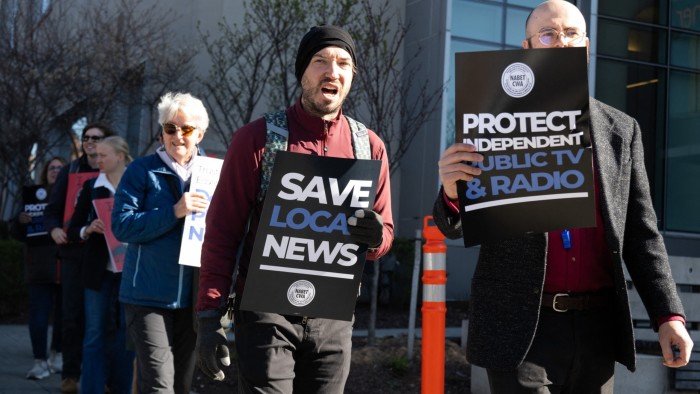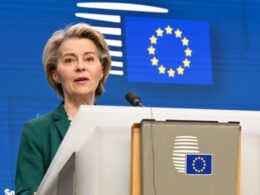Unlock the White House Watch newsletter for free
Your guide to what Trump’s second term means for Washington, business and the world
US President Donald Trump has moved to strip two major public media outlets of tens of millions of dollars in taxpayer funds under an executive order that marks the latest in a series of attacks on the press.
In the order issued overnight on Thursday, Trump accused the independent, non-profit Public Broadcasting Service (PBS) television network and National Public Radio (NPR) of failing to provide a “fair, accurate, or unbiased portrayal of current events to taxpaying citizens”.
“Government funding of news media in this environment is not only outdated and unnecessary but corrosive to the appearance of journalistic independence,” the order said.
The move escalates a crackdown on the free press that has involved banning the Associated Press from the Oval Office and Air Force One, and suing CBS television outlet.
PBS and NPR receive most of their funding from corporate sponsorships, philanthropic organisations and donations. But the White House said they earned tens of millions from the Corporation for Public Broadcasting, which was created in 1967 to support local radio and television stations, with national content provided by PBS and NPR.
The CPB receives more than $500mn per year from Congress, which it then allocates mostly to public television and radio stations, with some assigned to NPR and PBS. The CPB sued the Trump administration this week for attempting to fire three of its five board members.
NPR earns less than 1 per cent of its funds through federal money. However, the member stations that license NPR’s content receive an average of 10 per cent of their funding from the CPB.
PBS chief executive Paula Kerger said this week that about 15 per cent of the overall budget for public broadcasters came from the federal government.
Trump’s order will also end indirect funding to PBS and NPR by prohibiting local stations and any other recipients of CPB funds from using taxpayer dollars to support these organisations. It’s unclear whether the stations can use funds from elsewhere to license PBS and NPR content.
The White House said NPR and PBS “have fuelled partisanship and left-wing propaganda with taxpayer dollars, which is highly inappropriate and an improper use of taxpayers’ money”.
In a factsheet, it highlighted coverage deemed as biased, including that NPR insisted “COVID-19 did not originate in a lab and refused to explore the theory”, and that it ran a Valentine’s Day feature around “queer animals”.
Trump restricted the AP’s presidential access after the wire agency refused to use the name “Gulf of America” instead of Gulf of Mexico. His lawsuit against CBS alleged its show 60 Minutes deceptively edited an interview with Kamala Harris, the Democratic opponent he defeated in the November election.
CBS and its lawyers say the lawsuit is meritless, but owner Paramount is in talks to settle the case as it seeks regulatory approval for a merger with Skydance Media. The executive producer of 60 Minutes resigned last month, saying he had lost his journalistic independence.
Cuts to USAID funding sparked a financial crisis for media outlets around the world that relied on US support. Journalists at Voice of America were put on leave after Trump shut the US Agency for Global Media.
Source link









